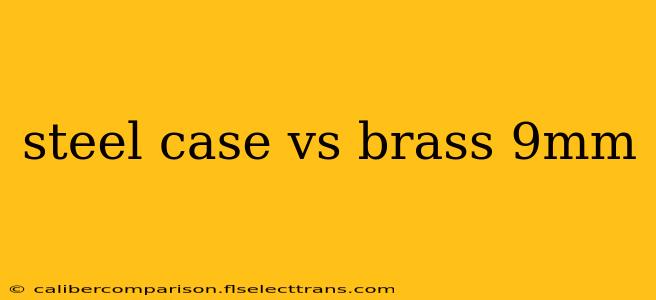Choosing the right ammunition is crucial for any shooter, whether you're a seasoned pro or just starting out. For 9mm shooters, a common dilemma arises: steel case vs. brass case ammunition. This comprehensive guide delves into the key differences between steel and brass 9mm ammo, helping you make an informed decision based on your needs and budget.
Key Differences: Steel Case vs. Brass Case 9mm
The most obvious difference lies in the casing material: steel vs. brass. This seemingly small distinction leads to significant variations in cost, performance, and longevity.
1. Cost: A Significant Factor
Steel case ammunition is considerably cheaper than brass case ammunition. This price difference stems from the lower cost of steel production and the simpler manufacturing process. This makes steel case a popular choice for high-volume practice sessions.
Brass case ammunition commands a higher price due to the cost of brass, the more complex manufacturing process, and the potential for reloading. The higher upfront cost is often offset by the ability to reload brass cases, making it a more economical option in the long run for frequent shooters.
2. Performance: Subtle Differences
While both steel and brass cases can deliver accurate shots, subtle performance differences exist.
Steel case: Often criticized for slightly lower velocities and increased potential for fouling in firearms. The harder steel can also cause increased wear on certain firearm components over prolonged use, particularly the extractor. It's generally not recommended for use in competition or precision shooting.
Brass case: Generally offers slightly higher velocities and cleaner burning, leading to less fouling. Brass is also more forgiving on firearm components, resulting in reduced wear and tear. The consistently higher performance makes it the preferred choice for competition and tactical applications.
3. Reloading: A Key Differentiator
Steel case ammunition is generally not reloadable. The steel casing is not designed for the high temperatures and pressures of the reloading process, and attempts to reload it can damage the reloading equipment.
Brass case ammunition is designed for reloading. Reloading brass cases offers significant cost savings in the long run and allows for fine-tuning ammunition to specific firearm characteristics. This makes brass ammo a more versatile and long-term economical option for serious shooters.
4. Environmental Impact: A Growing Concern
Steel case ammunition production has a lower environmental impact compared to brass due to the lower energy consumption and reduced material resource usage. However, the disposal of steel cases raises environmental concerns if not recycled properly.
Brass case ammunition production has a higher environmental impact, but the potential for reloading significantly offsets this impact, leading to less waste in the long run. Proper disposal or recycling of brass cases is also crucial for environmental sustainability.
Which 9mm Ammunition is Right for You?
The choice between steel and brass 9mm ammunition depends heavily on your individual shooting needs and priorities:
- Budget-conscious shooters prioritizing high-volume practice: Steel case is an excellent option.
- Competitive shooters or those prioritizing accuracy and performance: Brass case is the better choice.
- Shooters who reload: Brass case is the only practical option.
- Shooters concerned about environmental impact: While steel case production initially has a lower impact, the reusability and recyclability of brass might make it a more environmentally responsible choice in the long run, given proper recycling practices.
Ultimately, the decision comes down to balancing cost, performance, and reloading capabilities. Carefully weigh these factors to select the 9mm ammunition that best meets your specific requirements. Consulting with experienced shooters or firearm professionals can also provide valuable insights.

